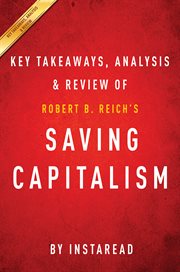Review by Publisher's Weekly Review
Nobel Prize--winning British economist Deaton (The Great Escape) lambastes American economic injustice in these feisty missives. In "Adventures in American Healthcare," he decries the country's medical system as expensive, wasteful, cruelly exclusionary of people without insurance, and difficult to understand (he found it almost impossible to determine how much his hip replacement would cost because of opaque hospital pricing and byzantine insurance rules). Elsewhere, Deaton criticizes the Chicago school of market-oriented economists for obsessing over efficiency while neglecting inequality and discusses research disproving conservative economists' contention that minimum wage increases raise unemployment. However, he often departs from liberal orthodoxy, arguing, for example, that foreign aid to poor nations is a waste of money that weakens their governments and that cigarette taxes are a form of paternalism that hurts people who have a right to enjoy a smoke. Deaton's prose is lucid and tartly down-to-earth (the U.S. government works "to help rich predators make ordinary people poorer," he writes), and he makes a convincing case that "economics should be about understanding the reasons for and doing away with the sordidness and joylessness that come with poverty and deprivation." The result is a refreshing take on America's economic discontents. (Oct.)
(c) Copyright PWxyz, LLC. All rights reserved
Review by Library Journal Review
When Nobel Prize--winning economist Deaton (Princeton Univ.; coauthor, Deaths of Despair and the Future of Capitalism) immigrated to the United States in the early l980s, he was shocked by the high level of crime unconstrained by any political or legal intervention. Many Americans were working for minimum wage, health care cost up to 20 percent of their income, and they had no retirement plans or secure futures. In this book, the author shows how U.S. economic policies contribute to growing despair and rising populism and promote a wider gap between the country's wealthy and low-income earners. As the rich get richer, health and safety protections for impoverished people shrink, with even their small safety nets under threat. As a solution, Deaton proposes that members of Congress and other policymakers base their decisions on current and future empirical research that shows not only the causes of economic policies but also the effects that are devastating for too many. VERDICT This brilliant economics study will likely engage general readers and hold their attention to the end. Purchase for behavioral and social sciences collections.--Claude Ury
(c) Copyright Library Journals LLC, a wholly owned subsidiary of Media Source, Inc. No redistribution permitted.
Review by Kirkus Book Review
A Nobel laureate reports on U.S. economic policy and the state of Anglo-American economics. A professor of economics emeritus at Princeton and author of Deaths of Despair and the Future of Capitalism, Deaton gathers essays he wrote for Britain's Royal Economic Society over the last 25 years. One set of essays addresses substantive concerns, including health care policy, inflation and its measurement, global poverty, pensions, wealth and income inequality, and class and generational social disparities. The author casts doubt on the magic of the "free" market and claims that economic thinking is helpful but insufficient given the extent to which it is ignored by policymakers and/or used simply to justify politically determined decisions. The other essays address the economic discipline: professional organizations, journals, core disagreements, and the Nobel Prize. Deaton boldly asks why economists fail to deliver economic policy that reduces inequalities. "We have certainly made too little progress on central policy questions that ought to be amenable to scientific inquiry," he writes. Internal disagreements, a failure of economists to recognize the political nature of advice-giving, the resistance of elected officials to issues of inequality, and the privileging of capital over labor in conventional economic wisdom stifle economic advice. Deaton bemoans American capitalism with its "government-enabled rent seeking and the destruction supported by the ideology of market fundamentalism." However, he refuses to abandon mainstream economics, noting that we "need to put the power of competition back in the service of the middle and working classes." To do so, the discipline must reconnect with its "proper basis, which is the study of human welfare." Written for non-economists to help them understand "how my profession works," the book is insufficiently attentive to the differences among and within the field's academic, policy, and business realms. A self-proclaimed contrarian mixes praise with disappointment to prod his colleagues in a more progressive direction. Copyright (c) Kirkus Reviews, used with permission.
Copyright (c) Kirkus Reviews, used with permission.

